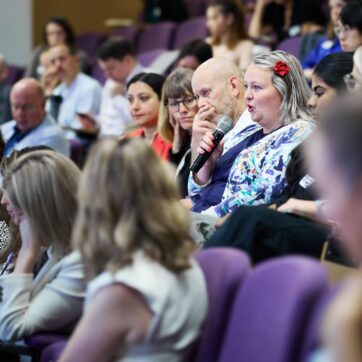Tell us about you
I’m Rich and I head up Nottingham Civic Exchange here at Nottingham Trent University. I am a knowledge broker located in professional services who harbours academic tendencies. Nottingham Civic Exchange supports staff and students to make a difference with their expertise and passions, with a focus on policy and civic impact. In short, I help people build on their brilliant work wherever that takes them. I also have a few projects of my own and I’m Co-Chair of UPEN’s Areas of Research Interest Sub-Committee.
Tell us about your personal career pathway
It’s a bit of a wiggly journey from late 18th century travel writing of Ireland, into youth, community and outdoor experiential learning through think tank and membership work into the university sector here at Trent. The thread has always been working with people to help them understand the work and achieve goals and ambitions.
How did your institution first come to be a member of UPEN?
We joined before it was officially called UPEN, having worked ourselves into a network of policy-focused professionals at the beginning of my Nottingham Trent University journey back in 2016 through our neighbours down the road at the University of Nottingham. I joined to find people doing the work I wanted to do, which was to maximise the potential of the colleagues I encountered here and to learn what worked where and how.
What is your institution’s overall approach to academic-policy engagement?
Nottingham Trent University is a progressive university with a strong commitment to making change happen for our students, staff and partners. A lot of our research has an applied focus, and we are passionate about enriching society and valuing people. Our academic policy engagement follows this approach with the support for Nottingham Civic Exchange and the great support of our Institute for Knowledge Exchange and Practice. We also have a growing number of Associate Deans for Practice who are helping to drive forward focus on impactful work with new and emerging partners.
Tell us about a specific policy engagement project or achievement from your institution that you are particularly proud of.
I’d love to boast about lots of great work we have done and I’m always blown away by the hidden work colleagues do to share research and insights to make a difference in so many places and spaces. Those who know me won’t be surprised by my focus on labour exploitation and the shadow economy. Through our research-informed policy and practice work, we have helped to challenge the status quo on informal work and reshape the debate on the hand car wash industry. At present, we are working to influence the Employment Rights Bill, the development of the Fair Work Agency and how local authorities and central government regulate the hand car wash sector (and other risky sectors) through the use of technology, enhanced transparency and connecting an exceptionally fragmented regulatory space.
From your institution’s perspective, what is the biggest value of being part of the UPEN network today?
I think the value is the connections, ideas and support that promote knowledge use and evidence-informing practice for our sector. I also think value is recognised by the reputational benefit of being part of UPEN. The funding we’ve secured through UPEN Programmes to expand the work we are doing to better understand how we utilise our expertise (of all types) to inform key decisions and debates has also been recognised.
Finally, what one piece of advice would you give to other members on how to make the most of their UPEN membership?
I’d say you get back what you put in, so find your area and your people and start there. The rest will follow.


